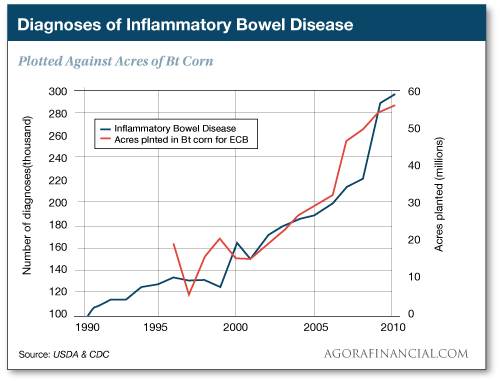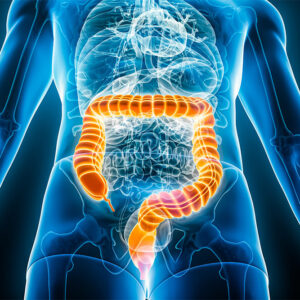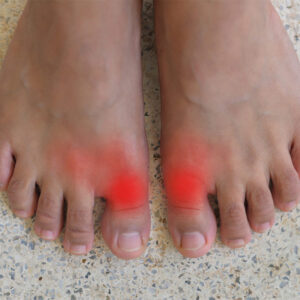
Another Reason to Avoid GMOs (As If You Needed One)
Dear Living Well Daily Reader,
I hate to preach to the choir. You already know to avoid GMOs.
You know that rat studies indicate they may cause tumors and reproductive defects.
But as I was talking with Brad Lemley, editor of Natural Health Solutions, a few weeks ago, an interesting question came up:
Are the ill effects from GMOs due to their genetic modification? Or do they create problems because they are sprayed with much greater amounts of pesticides and herbicides than non-GMO crops?
Or perhaps it’s due to a combination of both factors?
I tend to think the genetic manipulation does indeed play a major role.
GMO Bt corn, for example, is spliced with a gene from a bacteria called Bacillus thuringiensis (hence the Bt in Bt corn).
That particular gene produces an endotoxin that kills the European corn borer, a major pest to corn. And it does this by the following:
When a corn borer takes a bite of the corn with the Bt toxin, the toxin binds to the gut wall of the insect and causes the gut lining to break down. Then, the bacteria in the gut of the corn borer enter the blood and body of the worm and cause it to perish. 1
Though some scientists say that the toxic effects from Bt are “selective” and “safe for humans,” I’m not buying it.
The incidence of both intestinal permeability and inflammatory bowel disease in humans is on the rise. And the latter actually correlates nicely with the introduction and use of Bt corn:

And a study on pigs fed GM corn found that they had increased levels of stomach inflammation compared with pigs fed non-GM corn. 2
So back to the question of genetic modification versus pesticides — this particular genetic modification actually allows less pesticide use on corn, hinting that it’s not just the pesticides that are contributing to issues with GMOs.
But. (There’s always a but…)
The pesticides and herbicides are still an issue. Even if you don’t eat GM foods, you need to beware of pesticides and herbicides on non-GM foods.
And here another reason why: The EPA just approved the use of a new herbicide called Enlist Duo.
This chemical cocktail is a combination of glyphosate (Roundup) and 2,4-D (a component of Agent Orange).
As more and more weeds become resistant to Roundup, new herbicides are being created to combat the issue. And Enlist Duo is just in time to be used with GM seeds that are resistant to glyphosate and 2,4-D.
But as Dr. Philip J. Landrigan pointed out in an editorial published just last week in the New England Journal of Medicine, the EPA a huge mistake in approving Enlist Duo. 3
For one, the International Agency for Research on Cancer (IARC) has classified glyphosate as a “probable human carcinogen.” Yes, not just a possible carcinogen but a probable one.
The IARC also classified 2,4-D as a “possible human carcinogen.”
In addition, Dr. Landrigan believes that the science supporting the approval of Enlist Duo is outdated. It was commissioned in the ’80s and ’90s (by the herbicide manufacturer, no less), and the studies were not designed to detect the herbicides’ low-dose effects on genes and endocrine function.
The studies also shed no light onto potential health effects in infants and children, and do not take ecological considerations into account.
Lastly, the studies considered only pure glyphosate, not what is actually being used. Roundup contains surfactants and adjuvants that make it even more toxic.
And according to the EPA, this new approval will increase the use 2,4-D up to seven-fold, further saturating crops with this potential cancer-causing chemical.
The good news?
By choosing organic foods, you can avoid the whole mess. Organic foods must be non-GMO, and they cannot be grown with the use of pesticides or herbicides (among other rules).
And a new (albeit small) study published in the journal Environmental Research showed that by switching to mainly organic foods for as little as seven days, people were able to reduce organophosphate pesticide levels in their urine by almost 90 percent. 4
If you give your body the chance, it will try as hard as it can to detoxify itself from these chemicals.
So like I said earlier, I know I’m preaching to the choir here. But if you have a family member or friend that hasn’t quite gotten on board with avoiding GMOs and pesticide-laden foods, now you have a few more facts in your arsenal to share with them.
And if you’re like me and sometimes get lazy and don’t buy organic just to save a few bucks, a little reminder on the dangers of chemical-laden foods may be just what you (read: I) needed.
To living well,

Jasmine LeMaster
Health Researcher
View More Free Articles
Find Exercise Exhausting and Painful? Try THIS Natural Fix
If you’ve heard it once, you’ve heard it a thousand times: “You need to exercise.” And sure, you know how vital it is to healthy aging. But let’s be honest, sometimes it feels nearly impossible to get moving—especially when you know you’ll be sore for DAYS after. However, hold on to your seat because I’ve...
Mailbag: Unsteady on Your Feet? Now What?
“I’ve been having trouble with my balance lately and have fallen a couple of times. Could this be related to osteoporosis or another underlying cause?” – John Hi John, It’s always concerning when someone experiences balance issues or falls. While osteoporosis can contribute to an increased risk of falling, several other underlying causes should also...
Is There Really a Hidden Benefit to BROCCOLI?
Just when we thought broccoli’s resume couldn’t get any more impressive, new research proves us wrong. The phytonutrients in this tasty veggie can lower inflammation… balance blood sugar… and even boost your memory. And you likely already know of broccoli’s legendary prowess in preventing cancer. Now, a new study reveals that sulforaphane, the potent compound...
Belly Trick BOOSTS Brain Function
Boy do I love a cheap and easy solution. And if you can’t resist a good bargain either, keep reading. Because I have a brain-boosting one to share that fits the bill. If you’re like most folks, you intend to stay as sharp as a tack well into your golden years. So, you’re always on...
The Hidden Heart Danger LURKING in Your Gut?
Dear Living Well Daily Reader, Living with inflammatory bowel disease (IBD) is no walk in the park. The cramping, the urgency, the endless trips to the bathroom—it’s a daily struggle that can leave you exhausted and frustrated. And here’s the kicker: sometimes, IBD’s vague symptoms can lead to misdiagnosis or even NO diagnosis at all....
Has the Key to Unlocking Better MS Treatments Been Found?
Dear Living Well Daily Reader, Imagine waking up one morning and feeling a strange tingling in your fingers. You brush it off, thinking it’s just a pinched nerve. But then, your vision starts to blur, and your balance is thrown off. Suddenly, you’re faced with a terrifying reality: you have multiple sclerosis (MS). For the...
6 Secret Ways to Spot HIDDEN Processed Foods
“Avoid eating processed foods,”—If I’ve said it once, I’ve said it a thousand times. The reason why is simple. These Frankenfoods are designed to satisfy your taste buds. But they leave your body full of foreign chemicals that can cause harm and in need of more nutrients. But a patient asked me the other day,...
8 Red Flags There’s a Heart Attack in YOUR Future
Humor me and count to 40. Done? According to the Centers for Disease Control and Prevention (CDC), someone in the United States just had a heart attack. That adds up to around 805,000 people a year. Many of those were a “silent” heart attack, with the victim having no clue it even happened—and they go...
Mailbag! Neuropathy Pain? Ease Tingling in Hands and Feet
“I’m diabetic and have burning, tingling pain in my feet. My doctor says it is peripheral neuropathy, and there aren’t any cures. But do you have any tips to help me deal with it?” —Hank Hi Hank, Uncontrolled blood sugar can trigger nerve pain called peripheral neuropathy. This condition causes pain and numbness, usually in...
5 Often Overlooked Diabetes Red Flags
Some of the worst diseases we face are also the stealthiest. They silently sneak up with few signs that they’re harming us from the inside. Well, that is until it’s too late, and they’re well-established. Osteoporosis and hypertension are on that list. And so is type 2 diabetes. In fact, scientists estimate that around 25...









